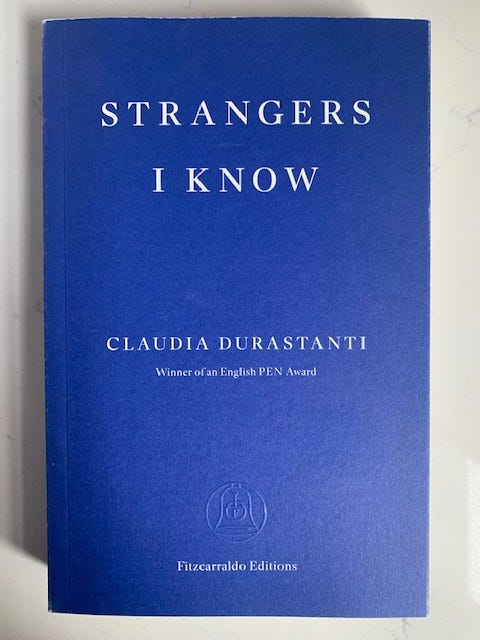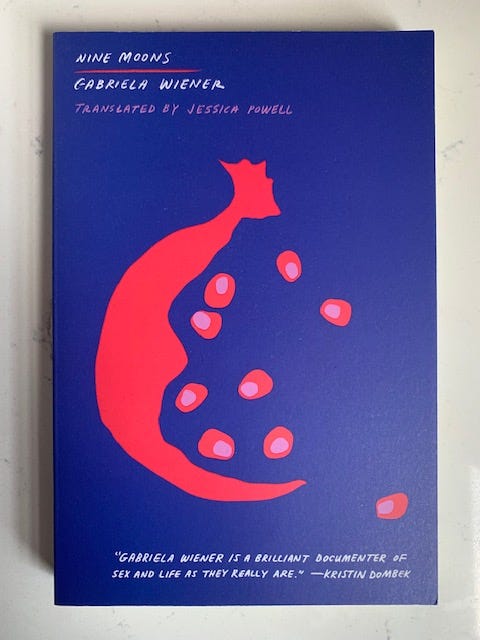'Strangers I Know' by Claudia Durastanti
'When everything collapses, love remains. But is it a true story?'—Review #193

It’s a solemn day, and I hope you’re all getting through it OK. Let’s discuss Claudia Durastanti’s newly translated novel, ‘Strangers I Know,’ that blurs the border between fiction and memoir.
Here’s the cover:

It opens with the narrator, also named Claudia, describing how her parents met. Her mother says she saved her father from jumping off a bridge in Rome. Her father says he rescued her mother from a robbery. Who knows if either tale is true, but what we do know is that both of them are deaf (like the author’s real-life parents), both are eccentric (and likely mentally ill) and neither learned to communicate with sign language. We see that their lives are composed of various myths, legends and events that Claudia examines not to determine what’s factual, but to find the hidden emotional truths behind them. The book unfolds like a collection of personal essays, and we see Claudia’s family struggle to communicate and to get by as she grows up during the 1980s and ’90s in Italy and in a neighborhood not far from where I’m typing right now in:

The stories are humorous and harrowing, but what sticks with me are the harrowing parts. There’s a scene at an Italian school for deaf children where Claudia’s mother is taught to make vocal sounds by nuns who hold a knife to her tongue so she’ll scream. In another scene (that the afterword suggests is a true story), Claudia’s father holds her, her mother and her brother hostage on a balcony while putting a knife to his own throat as the whole town looks up at them. Many times I had to put the book down because I needed both hands to go:
Yes, the story is intense, but don’t let that discourage you. There also are interesting asides that I loved, including one about the implications of the Italian verb sentire meaning both ‘to hear’ and ‘to feel,’ and another about the irrelevance of displaying musical notes on closed captioning. ‘Strangers I Know’ is a fascinating exploration of how well we know our parents and which pieces of their stories we carry forward. The writing is searing and direct, and the story moves quickly. I strongly recommend it.
How it begins:
My mother and father met the day he tried to jump off the Sisto Bridge in Trastevere. It was a good place to jump—he was a fine swimmer, but once he hit the water, he’d be paralyzed, and the Tiber back then was already toxic and green.
My mother always walked like it was raining, head down, shoulders hunched, especially when she was alone, but that day she stopped on the bridge, and saw a boy straddling the parapet wall. She came closer, laid her hand on his shoulder, to pull him back; maybe they scuffled. She persuaded him to calm down, breathe slowly, then they took a walk through the city, got drunk, and wound up at a hotel with stiff sheets that stank of ammonia. Before dawn, my mother put her clothes on and left. She had to get back to her boarding school and my father seemed so restless; she didn’t even shake his shoulder to let him know she was going.
The next day, she stepped outside the school with her girlfriends and saw him leaning against a car, his arms crossed, and right then, she knew she was doomed. I’ve always envied her mystical, woeful expression when she speaks of him at that moment; I’ve always been jealous of that apocalypse.
Who they thanked:
Here’s another new Books on GIF feature that will parse an author’s acknowledgements. It’s inspired by a Twitter exchange, and will be rotated into the newsletter like our cheese pairings. I always read the acknowledgements, even though they are often perfunctory nods to friends, family, agents, editors and publishers. Occasionally, though, you can get fascinating insights into the author and the book,1 and we lucked out by launching this section with Claudia Durastanti. Here's how she starts her acknowledgements:
This book is dedicated to a girl and a boy who lived through their deafness with recklessness.
While I was trying to be brave or to be good, they were teaching me how to be free.
I hope I was able to mirror their recklessness at least in fiction and to finally become their ‘true’ daughter in the realm of the imagination.
Oof, that last sentence. You can feel her frustration, anxiety and love toward her parents, as well as her yearning to be closer to them. Though the book is a work of fiction, it seems real enough potentially to expose her and her parents to the bitter scrutiny of strangers they don’t know. It feels like playing with matches, but fire can clear away dead things and fertilize the land. Will a spiritual connection to her mother and father grow and be stronger than the biological one? I hope so, too.
My rating:
‘Strangers I Know’ (La straniera) by Claudia Durastanti was originally published by La nave di Teseo in 2019. It was published by Fitzcarraldo Editions in 2022. Translated from the Italian by Elizabeth Harris. 261 pages. $25.11 at Bookshop.org.
What’s next:
Before you go:
ICYMI: Review #192
Read this: This edition of Dirt features book and perfume pairing recommendations. The Iris Murdoch and Eve Babitz books/scents look interesting, but I am particularly intrigued by Cookie Mueller’s collection ‘Walking Through Clear Water in a Pool Painted Black,’ which the newsletter’s writer Alana May Johnson pairs with a fragrance called UFO Parfums Love Potion No. 3 that apparently contains notes derived from the urine and feces of an animal called the hyrax. ‘Not a scent for the faint of heart!’ I will not rest until I smell it.
Do this: My fellow newsletter writer Elizabeth is hosting a meetup for book newsletter writers who publish on Substack. I’ll be there! If you’re a ‘book stacker,’ we’d love to meet you. Here are the details.
Thanks for reading, and thanks especially to Donna for editing this newsletter!
Until next time,

MPV
Newsletters you ♥️ the most
For example, my understanding of Nuruddin Farah’s ‘Hiding in Plain Sight’ was completely changed after reading the acknowledgements.









Oooh I love the new feature! I always always read acknowledgements — it's such a fun glimpse into the author's mind!
When I recently read Cleopatra and Frankenstein by Coco Mellors, I was floored by one line in her acknowledgements — (about her husband)
"Thank you for loving me, for marrying me, and for creating a life with me far too honeyed and harmonious to ever make for interesting fiction. I'm yours."
What a line of pure poetry.
I love reading acknowledgments--one of my favorite parts of the book! I know I work in publishing and am always looking for friends' names (and sometimes mine! never gets old!), but I also love reading a tiny bit about who inspired them, the pets that cheered them on, the works that influenced them. Such a fun way to end a book experience for me.